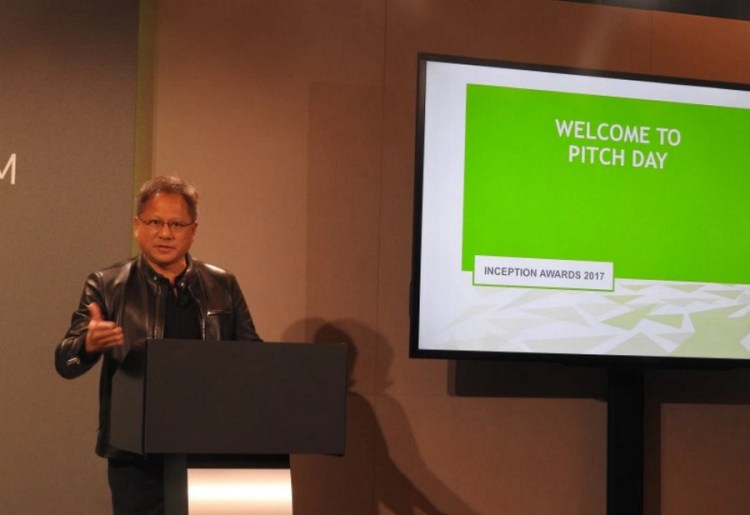Watch all the Transform 2020 sessions on-demand here.
Artificial intelligence is hot, and you can tell that because both giant companies and tiny startups are excited about it. Nvidia, which had $6.9 billion in revenues last year, is in touch with more than 2,000 AI startups around the world. And this week, the graphics chip maker and AI company took a step in figuring out which ones are the best.
Jen-Hsun Huang, CEO of Nvidia, hosted a Shark Tank style event called Nvidia Inception to find the best AI startups. Huang and a panel of judges listened to pitches from 14 AI startups across three categories. They were filtered from more than 600 contestants who entered the Nvidia Inception contest, and the winners will walk away with $1.5 million in cash at a dinner on May 10 at Nvidia’s GPU Technology Conference.
“We are in the beginning of one of the largest computing revolutions that we have ever been through,” said Huang, at the beginning of the event. “The AI revolution is upon us.”
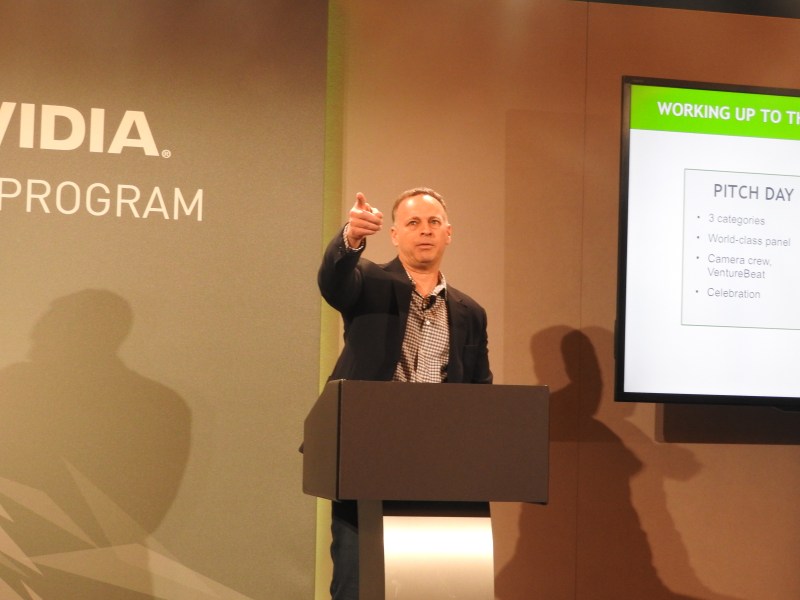
Above: Jeff Herbst of Nvidia.
The judges include Gavin Baker, portfolio manager for Fidelity Investments; Tammy Kiely, global head of semiconductor investment banking at Goldman Sachs; Shu Nyatta, investor for the SoftBank Group; Thomas Laffont, senior managing director for Coatue Management; and Prashant Sharma, global chief technology officer for Microsoft Accelerator.
June 5th: The AI Audit in NYC
Join us next week in NYC to engage with top executive leaders, delving into strategies for auditing AI models to ensure fairness, optimal performance, and ethical compliance across diverse organizations. Secure your attendance for this exclusive invite-only event.
Jeff Herbst, vice president of business development at Nvidia, said in an interview with VentureBeat that the company decided to create a meaningful award to recognize the amazing work being done by AI startups. The three awards will focus on the “hottest emerging startup,” the “most disruptive startup,” and the startup with the “most potential for social impact.”
I listened to the companies give their pitches to the judges, and this story will focus on the four companies that gave pitches for the hottest emerging startup. The qualifying rule for these companies is that they cannot have raised more than $5 million yet. There will be one winner in each category that wins $375,000, and the runner-up in each category will win $125,000. (We will do other stories on the disruptive and social impact startups later.)
1. Focal Systems
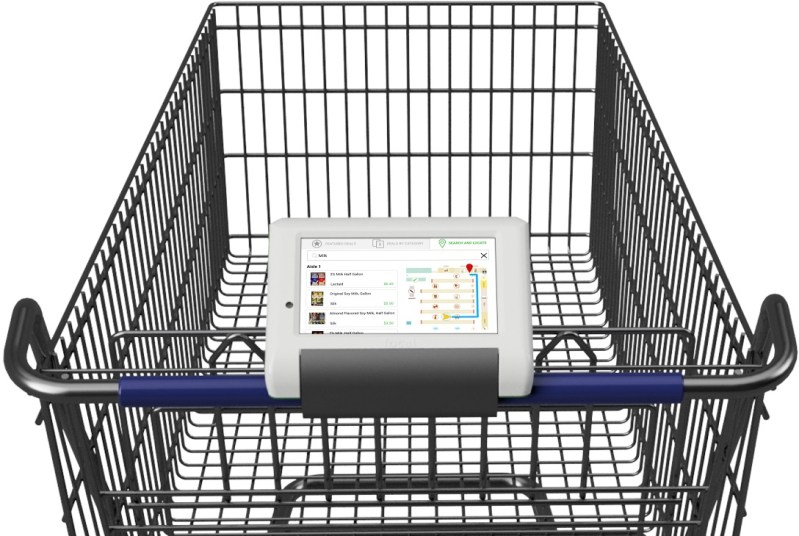
Above: Focal Systems is adding tablets to shopping carts.
Francois Chaubard, CEO of Focal Systems, said he went to a talk in 2015 and got all excited about self-driving cars. But afterward, he went to a grocery store with a friend and found that the shopping experience was anything but automated. So he set out to create the “operating system for brick and mortar retail.”
Part of the solution is hardware. Focal attaches a generic Android tablet to a shopping cart (in a way where it can’t be destroyed by kids). It has a side-mounted camera that looks at the shelves, and there are two separate cameras that see what you put in the cart. Those cameras send the data to a hub in the store, which analyzes them. Using computer vision and artificial intelligence, it figures out what you have placed in the cart, tallies the total, and displays what you are buying on the tablet as you shop. You can skip the checkout counter and wheel the cart out to your car.
“We take the AI algorithms that are super cool and apply them to the in-store shopping experience,” Chaubard said. “RFID [radio frequency identification tags] promised this, but it never accomplished it.”
The side camera on the tablet can take images of the aisles and discern which items are out of stock. That means that clerks no longer have to do that task. Currently, product makers often have to pay $30 per store to find out if their own items are out of stock; this could reduce that cost. Shoppers can also use the coupon finder on the tablet to get discounts on items they’re going to buy. The tablet can also handle voice-driven customer service.
Chaubard said his research showed that a single Wal-Mart store employs 238 people with a labor cost of $572,000 per month. Of the cost, 24 percent covers cashiers, 22 percent customer service, 11 percent scanning, and 43 percent stocking. That means that with Focal Systems, about 57 percent of that labor cost — scanning and stocking — is “redeployable” for $326,000 a month in savings.
The addressable market is about $13 billion, Chaubard said. Focal Systems is working with major product companies such as Anheuser-Busch, and it charges a monthly service fee for the retailer. It could also make money via the data it collects in the stores.
Rivals include Amazon, but many product companies and retailers don’t want to work with a competitor, and Focal Systems positions itself as a neutral services provider.
“Others are terrified of Amazon moving into this space, and everyone is looking for an answer,” Chaubard said.
The company has 15 employees, and it has raised $2.5 million from Zetta Venture Partners and SoftTech VC.
2. Datalogue
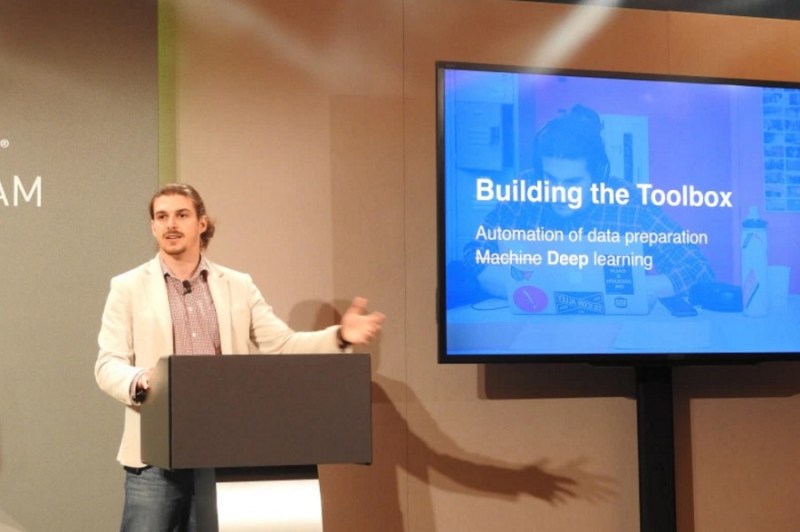
Above: Tom Delisle, CEO of Datalogue.
Tim Delisle, CEO of Datalogue, said that he heard that the best companies are formed by those who feel the pain of the customers. He said that, as a former data scientist at Merck, he knew that data scientists were feeling a lot of pain. They want to be analysts with deep insights into their data, but they are often more like data janitors, cleaning up data so that it can be in the right form for them to analyze.
Datalogue uses deep learning to take that cleanup task off their hands and free them up for analysis. The New York startup is working with its customers to analyze their data and set it up in a way that it becomes useful. For instance, some sensitive data has to be anonymized before it is passed on to another party. Datalogue can take that data and do that work.
“We offload the data scientist who has to spend 80 percent of time on cleaning up data,” Delisle said.
Datalogue’s business is to automate data preparation. It uses AI to understand semantically what is in the data, regardless of the type of data. It can parse, slice, flag, and map the appropriate data so that a customer can get some insight. And Datalogue can also do tasks such as detecting fake phone numbers in data at a “superhuman scale,” Delisle said.
Delisle said his tech can get the job done ten times faster than the competition, and ten times cheaper than manual labor. Initial “anchor” customers in each category can help pave the way for Datalogue to serve all of the customers in that category. A couple of anchor customers are paying more than $500,000 a year for Datalogue’s work. The company is working with customers such as large financial data providers.
A customer purchases certain “ontologies,” or types of data they want to identify and clean. The mapping of that data allows the customer to see the data in a more transparent way and deal with issues such as privacy regulations.
“Our competitive advantage is we get exposed to data that Amazon has never seen,” Delisle said. “We build solutions to automate the data cleaning processes of a much larger breadth of data.”
The company has 5 employees and was founded in February 2016. It has raised $1.5 million from Flybridge, Bloomberg Beta, and Nvidia.
3. Deepgram
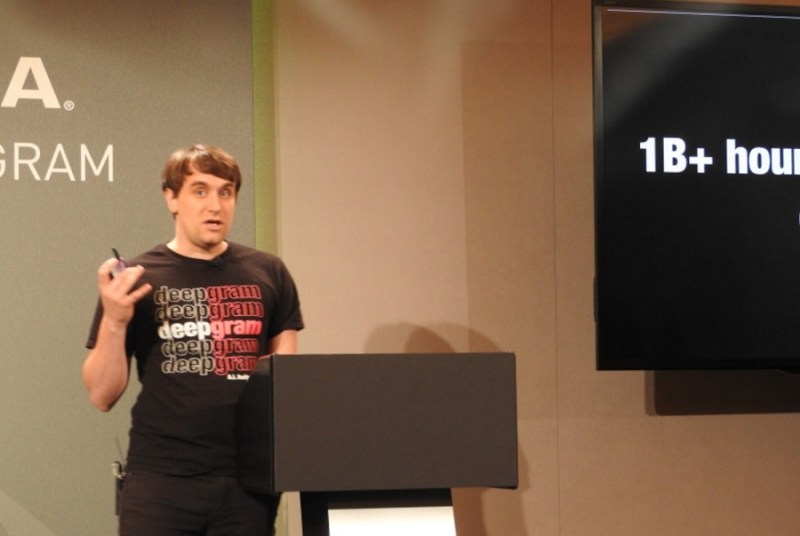
Above: Scott Stephenson, CEO of Deepgram.
Scott Stephenson, CEO of Deepgram, started on his march toward recognizing spoken words through dark matter. He has a background in particle physics, and he was searching for dark matter, a type of matter that physicists and astronomers care a lot about, deep underneath the ground near a dam in China. His team had to create a way to analyze waveforms to identify dark matter.
It turns out that this skill is exactly what is needed to recognize spoken words, Stephenson said. He said that voice recognition services like Siri have an error rate as high as 50 percent in recognizing conversational words. But Deepgram has used deep learning and its waveform recognition technology to take the accuracy for recognizing spoken words to over 80 percent, he said.
“We build audio AI brains,” Stephenson said.
This can be useful in places like call centers, where transcribing and analyzing calls is a part of the process of reviewing quality. Typically, only 2 percent of the calls are ever analyzed in this way. But the Deepgram tech can analyze audio data and spot keywords, transcribe, and get insights from phone calls. It can do the same for video footage and online media.
The company has 15 employees, and it has raised $1.8 million from Compound and Y Combinator. It is focused on English for now, but could expand to other languages later.
4. Athelas
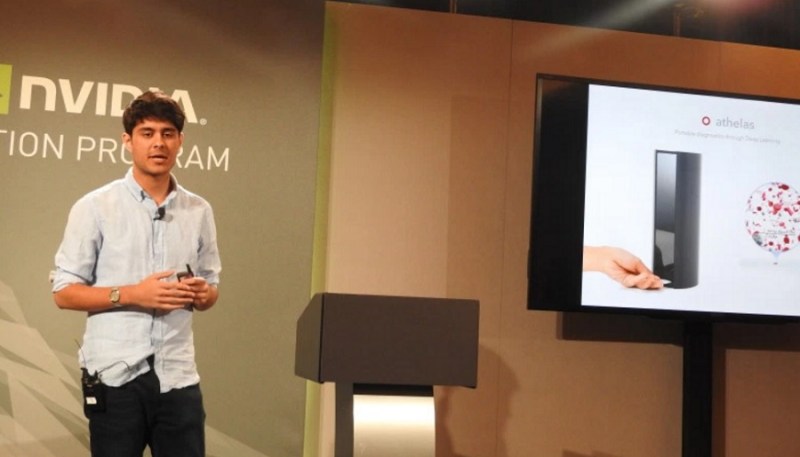
Above: Tanay Tandon, CEO of Athelas.
Theranos, the blood analysis company that crashed and burned in a fraud scandal, might have fared better if it had gone down the path of Athelas. While Theranos tried to perform all sorts of test on a drop of blood, Athelas has made an inexpensive machine that is focused on just one of the most common types of blood tests.
Using computer vision and deep learning algorithms, Athelas has created a machine that looks at a drop of blood and identifies how many white blood cells it has, said Tanay Tandon, founder of Athelas.
“Blood is the window into someone’s health,” said Tandon. “The core of what makes it possible is deep learning.”
The imaging system has a patented flow test strip that can spread the drop out to a single cell layer. After it is scanned, the convolutional neural network goes to work on identifying what is in the sample. It can identify problems in a couple of minutes, and it can then tell you the results of the test much more quickly than current methods. It can detect white blood cell trends, leukemia, infections, inflammation, and other problems.
Athelas is going after a $50 billion market. The machine costs about $250 to make, and Athelas sells it for about $500. It can also generate about $5 in revenue per test. That is far less expensive than standard lab tests, which typically cost $30 to $50 each. Moreover, Tandon said, about $100 billion is wasted every year in treating diseases that are diagnosed late.
The company did a clinical trial with 350 patients, and it identified undetected leukemia in one patient. It is now doing about 100 tests per week with full accuracy, Tandon said. He hopes to ship about 10,000 machines by the end of the year.
The company has six employees, and it has raised $3.5 million from Sequoia Capital and Y Combinator. The product has been clinically validated and is undergoing clearance from the Food and Drug Administration. Athelas (named after a healing plant in The Lord of the Rings) was formed in May 2016.
Over time, Athelas could expand the testing to other kinds of liquid analysis, such as urine. The company would like to focus on selling a subscription model where there’s a monthly fee for a certain number of tests.
